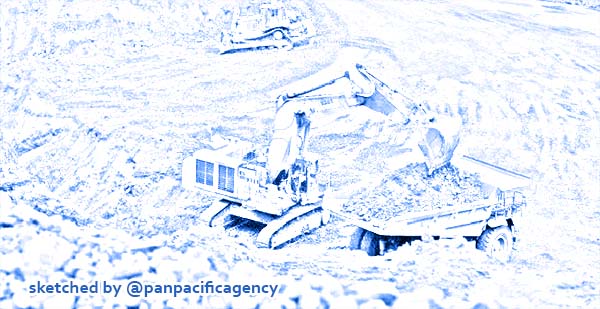Indonesia’s govt defends nickel export ban amid EU complaints

Activities at a nickel mining site. (Kontan/Cheppy A. Muchlis). Sketched by the Pan Pacific Agency.
JAKARTA, Dec 18, 2019, The Jakarta Post. Coordinating Maritime Affairs and Investment Minister Luhut Binsar Pandjaitan has said Indonesia will fight the European Union’s lawsuit on the country’s nickel export ban, The Jakarta Post reported.
“As it stands, 98 percent of nickel ore is exported to China while Europe takes only 2 percent. So why do you say I’m defending China?” Luhut said during his visit to Tanzania on Tuesday.
“Don’t ever [let] any country dictates Indonesian policy,” he stressed.
Luhut’s statement follows the Nov. 22 filing of an EU lawsuit challenging Indonesia’s nickel ore export ban through the World Trade Organization (WTO). The suit said the ban was “against WTO rules”.
The Energy and Mineral Resources Ministry introduced the nickel export ban to push local extractors to refine the ore domestically and export higher-value commodities. The ban will take effect in January 2020, two years earlier than previously planned.
As the world’s largest nickel producer, having extracted a quarter of the global nickel supply last year, Indonesia has shocked foreign manufacturers including those in China, Europe and Japan.
“The restrictions unfairly limit access by EU producers to raw materials for steel production, notably nickel, as well as scrap, coal and coke, iron ore and chromium,” the European Commission said in its statement in November.
The EU also challenged alleged illegal subsidies and claimed that Indonesia’s manufacturing methods produced up to seven times more carbon dioxide emissions than the processes used in Europe.
The Trade Ministry has denied all of the EU’s claims.
Luhut said the move reinforced the 2009 Law on Coal and Mineral Mining, which sought to prohibit the export of raw materials five years after the law took effect.
“But there was a policy at the time [to allow raw material exports] for a few more years [after the five-year period],” said the closest aide of President Joko “Jokowi” Widodo, explaining how the country had continued to export nickel after 2014.
Japan had threatened to file a similar complaint with the WTO in 2012, two years before Indonesia was expected to enforce its first nickel ore export ban in 2014. Japan did not ultimately submit the complaint, and Indonesia lifted the ban in 2017.
Jokowi has also defended the government’s trade-strategy position.
“We can’t be pressured by external parties. With regard to palm oil, we are pressured by the European Union. Other countries pressure us about nickel […] No more!” he said earlier this month.